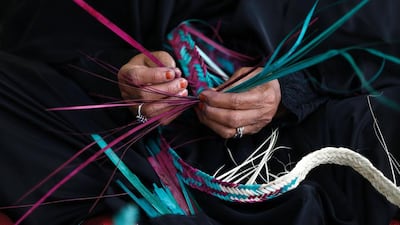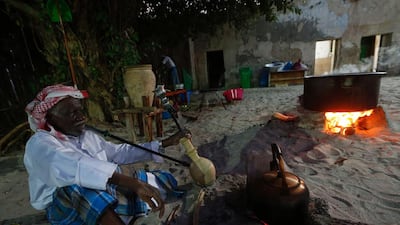Related: Seven highlights from the life of Sheikh Dr Sultan Al Qasimi
Sparsely developed, no buildings for long stretches, no paved roads and very few cars on the roads - that is how long-time residents of Sharjah remember the city in the late 1960s and early 1970s.
It was around this time, in 1972, when a young member of the Al Qasimi family was unanimously selected to become the Ruler of the Emirate.
And then began the rule of Sheikh Dr Sultan bin Muhammad Al Qasimi, who on Tuesday completed 50 years in service.
He had big plans. He wanted to transform the emirate but preserve the heritage and culture of the city.
Long-time residents of the city recall the period just before Sheikh Dr Sultan came to power.
Sharjah resident
Nawal Al Ashram, who came to the UAE in 1963 to take on a teaching job in Dubai, told The National she never imagined the city would change so much.
“The difference between Sharjah then and now is the difference between the land and sky,” she said.
Ms Al Ashram said she vividly remembers the day she landed in the emirate for the first time – before the UAE was formed.
"My plane landed at Sharjah Air Station," she said.
Sharjah Air Station was the oldest airport in the UAE and opened long before the sprawling international hubs that now serve Dubai and Abu Dhabi.
The station was converted to a museum in 2000 and highlights the region's aviation achievements.
Ms Al Ashram said that was a time when goods and the latest products were more readily available in Sharjah than in other emirates, making it a popular shopping area.
“I remember going to Sharjah every Thursday for grocery shopping because that was when products arrived,” she said.
But because there were no air-conditioned malls, she said she often sat under the famous Rolla tree to escape the heat.
“My brother and I would sit in its shade when we came for shopping, as did many others because goods only came on Thursdays,” she said.
“But there was sand all around, the asphalt roads you see now did not exist, and the buildings were nowhere to be seen,” said the 83-year-old Jordanian citizen, who now lives in Umm Al Quwain.

Saeed Al Tareefi, 73, another long-time resident of the city, said he missed the chance of buying land at ridiculously low prices.
“I was offered a land plot to buy near Sabaa hotel in Sharjah, but I refused out of fear of how empty the area was,” he said.
“During my first years here, there were no buildings to see in Sharjah, just a few scattered and small residential neighbourhoods,” said Mr Al Tareefi, who started as a translator at Abu Dhabi port in 1969 but later became an education expert.
“I'm very proud that I have witnessed not only Sharjah’s journey of progress but that of the country and its formation.”
That was also a time when there was no culture of needing appointments to meet people, including the royals.
Sheikh Dr Sultan was just as accessible then as he is today – the only difference being that technology has replaced face-to-face interaction.
Ms Al Ashram said she often heard from others how men would go to the Ruler's house to share their concerns.
“His majlis was always open for all people to come and share their problems or joys,” she said.
Today, Sheikh Dr Sultan still listens to the problems of his people, albeit on the radio.
He is always aware of people’s needs and the problems they are facing. Sheikh Dr Sultan launched the Al Mabarrah radio programme in 2012 to stay in touch with the common people and offer them an easy channel to connect with him.
Residents often share their concerns on the radio. Sheikh Dr Sultan has been a regular listener for years. He answers queries, responds to complaints raised and orders new projects that can help to improve people’s lives.
Culture and building a city for its people was always at the core of Sheikh Dr Sultan's growth plan. He did not want concrete to replace culture.

“The city has [managed] to balance the development of the emirate where the progress didn’t kill the identity of the city," Ms Al Ashram said.
In less than a decade of Sheikh Dr Sultan's rule, the city got its new airport, a humanitarian services city, and Al Jazeera park.
During the 1980s, he established the Department of Culture, which later branched out into other departments such as Sharjah Art Foundation, Sharjah Book Authority, Sharjah Publishing City, and Sharjah Heritage Institute, among others.
It was around this time that the city launched Sharjah Theatre Days and its Children’s Culture Festival.
Centres and clubs geared to family, children, women and disabled people were opened.
"There was no road beyond the hotel I stayed in, just sand. But look at it now, it has become a global city, a cultural capital and an economic centre," Mr Al Tareefi said.







































